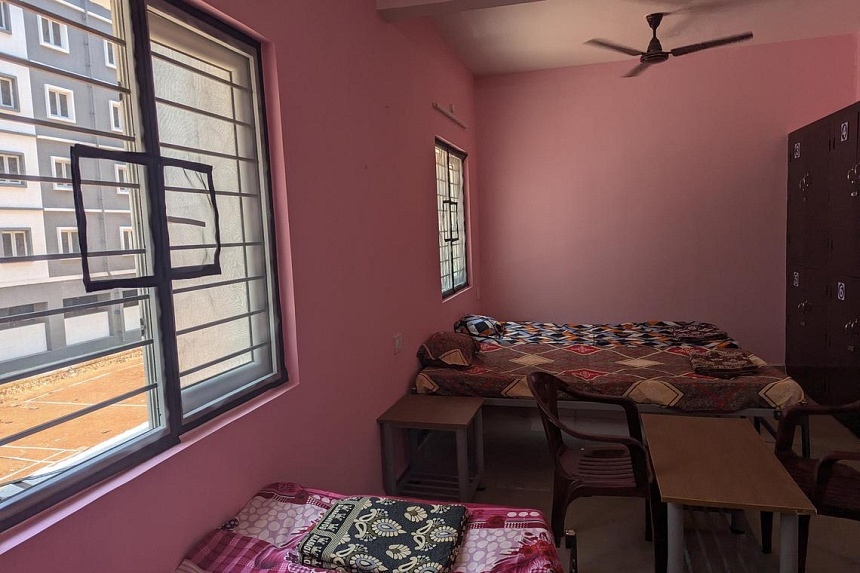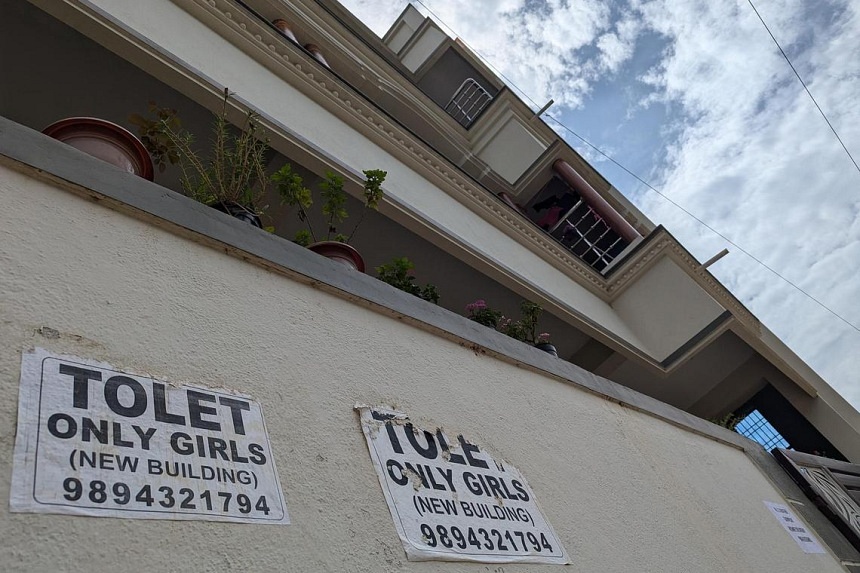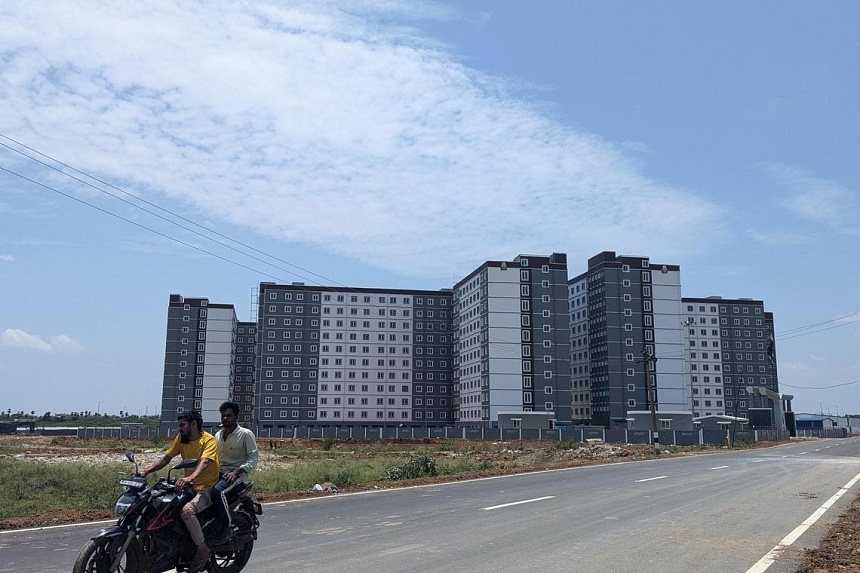SRIPERUMBUDUR, Tamil Nadu – Giant 10-storey blocks stand like a grey Lego complex at the curve of a freshly tarred road in Vallam Vadagal village in Tamil Nadu.
By the end of 2024, these buildings will house 18,720 women working at the biggest Indian factory of Taiwanese iPhone contract manufacturer Hon Hai Technology Group, better known as Foxconn.
Spanning 8.1ha – around half the size of Singapore’s Marina Bay Sands – the facility is India’s first residential complex of such a large scale built by a state government for a private company. It is partly modelled on industrial townships in China and Vietnam.
In a sign of increasing focus in India on providing safe, reliable accommodation for migrant factory workers, especially women, the Gujarat and Assam state governments in the west and north-east have also announced the building of such housing complexes.
Though India’s female labour force participation was only 25 per cent over the past decade, more women have been entering the traditionally male-dominated manufacturing sector in recent years.
Women now play a significant role beyond textile and garment factories, particularly in the emerging sectors of electronics and electric vehicles.
Foxconn’s largest footprint in India is in the southern state of Tamil Nadu, where it employs around 41,000 workers, of whom 35,000 are women.
Inaugurating the residential facility on Aug 17, Foxconn chairman Young Liu said: “This will be home to thousands of women who will find a job with Foxconn. They will come from many regions in India, from all walks of life, at different stages in their lives.”
The sprawling government residential complex in Vallam Vadagal is 20 minutes from Foxconn’s mega manufacturing site in Sriperumbudur via company shuttle. It has 24 rooms per floor, each room accommodating six employees.

The facility is not just a hostel, but a residential complex with open-air gyms, recreational areas like badminton courts and lawns, and a cafeteria and dining hall, which the company will manage. It also has CCTVs and a back-up power system.
At the moment, some Foxconn employees stay in a hostel within the company premises and others share rooms in neighbouring villages. Workers will be asked to move to the new complex from October, government sources said.
“Once the residents move in, we will also lease the adjacent 1.2ha land for a shopping complex, with ATMs, restaurants, grocery shops, library, beauty parlours and everything working women need,” said Dr K. Senthil Raj, managing director of the State Industries Promotion Corporation of Tamil Nadu (Sipcot), which constructed the complex.
The state is investing in staff housing to not just attract global manufacturers and out-of-town qualified female workers, but also improve safety and reduce absenteeism and late reporting that affect productivity.
This marks an attempt to shift from the scattered privately run women’s hostels in villages and towns to government-run housing that factories can rent for workers.
Tamil Nadu government’s Chief Secretary N. Muruganandam said: “We know that industrial housing complexes in manufacturing hubs will boost productivity and improve employment. Along with qualified manpower, this is social infrastructure that will give the state a competitive advantage to attract more investment.”
He added: “South-east Asian countries and China have a township model for worker accommodation. While entire townships are not feasible in populated India with shrinking land parcels and diverse players, we decided to build a residential complex that Foxconn can rent.”

The neighbouring state of Telangana has, meanwhile, offered about 809ha of land to Foxconn to set up a “Foxconn City”, similar to the company’s enormous Zhengzhou facility in China, which includes a factory, dormitory-style housing, hospitals, a fire station, cinemas, supermarkets and cafes.
Around 1.6 million women work in manufacturing in India, and 42 per cent of them are in Tamil Nadu, home to the highest number of factories in India, including those of global manufacturers like Foxconn, Pegatron and Hyundai.
Studies attribute the greater share of women in the workforce here to more urbanisation, gender equity, law and order, cheap transport, and decades of state investment in education and public health that have created a generation of skilled and empowered young women.
Female workers from across the country who live in villages near the Sriperumbudur industrial area told The Straits Times that dignified, affordable housing would be a game changer, but existing facilities tend to prioritise security over freedom.
“I moved out of the company hostel because we were allowed to leave the premises only on Sundays. It felt like a prison, and I didn’t like the food,” said Ms Roopkunwar, 20, who declined to give her real name for fear of losing her job over the criticism.
She works for an American electronics manufacturer and now shares a room in a village house with six other girls.
But as rents increased or roommates changed, Ms Roopkunwar and her sister from the central state of Chhattisgarh have had to move house five times in the past year.
“I have lost weight, I fall sick often and am not able to save up to send money home to my farmer parents – all because my basic stay is uncertain,” she said.
Housing has been a concern for foreign employers too, like global manufacturing companies from Taiwan, Japan, South Korea, Germany and the US.

The new state-built housing was in fact born of a crisis in 2021, when Foxconn employees protested against the poor living conditions at the company’s bunk-bed hostel in Sriperumbudur, leading to the temporary closure of the plant.
“State-built affordable industrial housing allows the companies to focus on production and business, and for the government to take care of its people,” said Mr Muruganandam.
In China, local governments have funded the construction of some dormitories that can house thousands of workers.
More residential complexes are under way in India.
In Hosur, a growing electric vehicle hub, the Tamil Nadu government and Indian conglomerate Tata Electronics are building housing for 6,300 employees.
“Such housing serves many purposes, like retaining employees long term, improving efficiency, reducing transportation costs, and attracting workers from all over the country,” said Mr Sandeep Nanduri, managing director of the Tamil Nadu Industrial Development Corporation, which is in charge of the Hosur project.
As requests are now pouring in from other companies too, Sipcot and the Tamil Nadu Infrastructure Fund Management Corporation have established a separate government agency for industrial housing.
Housing projects to accommodate 800 to 2,000 workers are under construction in the Siruseri IT Park and Cheyyar non-leather shoes manufacturing hub as well.
The government is also renovating some of its “working women’s hostels” built in the 1980s near IT parks and industrial hubs. A warden in the Tambaram hostel in Chennai, which is close to several global software companies, said that although they were fully booked, she receives five to six inquiries from women every day.
Ms Sangeeta (not her real name) left her home in another district in Tamil Nadu to work as an assembly line operator in Foxconn.
The 25-year-old said she wanted to not only help ease her family’s financial burdens but also to “know the world outside and learn to become smart and independent”.
She requested anonymity as her employer forbids workers from speaking to the media.
As she waited with dozens of other women for the chartered bus before her 2pm shift, she said she was eager to move into the government-built residential complex.
Her parents have always been worried about her life far away from home, but “they trust that a government-built facility might be better, safer, and there will be more accountability if something bad happens”, said Ms Sangeeta.
“Maybe once my housing anxieties are settled and I have a peaceful room, I can focus on studying new courses or applying to college.”


